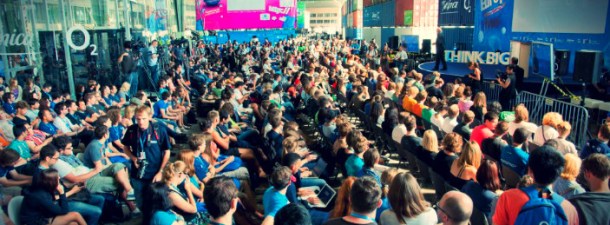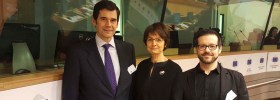By Daniel Appelquist (@torgo), Open Web Advocate at Telefónica Digital. Dan is a web and mobile industry veteran, an active member in the World Wide Web Consortium (W3C) and founded Mobile Monday London, Over the Air and the Mobile 2.0 conference series.
 #TheOpenAgenda at Campus Party. It’s an initiative I’m proud to be part of because it’s a subject I’m passionate about.
#TheOpenAgenda at Campus Party. It’s an initiative I’m proud to be part of because it’s a subject I’m passionate about.
To kick things off, I hosted a panel discussion exploring the concept of an open web, the subject of the first part of #TheOpenAgenda. Joining me on the panel at Campus Party were: Jon ‘Maddog’ Hall, Executive Director, Linux International; Ali Blackwell, CTO and Co-founder, Decoded; Christian Heilmann, Mozilla Developer Evangelist; and Richard Bridger, Senior Consultant, Populus.
#TheOpenAgenda is intended to encourage debate around the benefits of an open philosophy for digital technology and innovation. An open agenda, where collaboration is more important than competition, leads to massive benefits for consumers, businesses, governments and society.
#TheOpenAgenda is a cross-industry project which will gather the views of leading thinkers from across the open movement. It will dig deep into the meaning of open across three key areas: open web, open data and open innovation.
The concept of open is widely recognised today in the technology and digital industries as a fundamental force for good for consumers, businesses and the public sector. At Telefónica we believe the transformational possibilities of technology should be kept open to everyone and that technology is the engine of the economy, a key driver of social good and enabler of human progress.
Consumers are finding themselves corralled into proprietary ecosystems by companies such as Google and Apple. Content bought through their services, for instance, is not transferrable when their customers switch and choice is being dramatically curtailed. Put simply, the Google and Apple app store duopoly is stifling innovation.
“Apps per se are not bad but restricting apps to one platform is bad and the way apps are controlled if developed for one platform is bad,” said Hall.
But it doesn’t have to be that way. The World Wide Web, which has revolutionised every aspect of our society and economy, was built on a principle of openness that has resulted in the birth of some of the most innovative and disruptive companies the world has ever seen.
“There is a honeymoon period with apps at the moment but developing native apps locks you in to one platform and can limit you as a developer,” said Heilmann. “I’d like to see the app market develop, through open web technology, so that people can be both makers and consumers of apps.”
“That is what is so exciting, especially in terms of inspiring young people, that you can build an app using open web technology like HTML5,” agreed Blackwell.
The panel’s views were heartening as at Telefónica we firmly believe that technology should be kept open to everyone. Open is a crucial part of our commitment to the future. We believe in open standards, open innovation, and the power of open knowledge.
But we should be under no illusions of the challenges that remain ahead. To succeed, openness must combat a deeply ingrained attitude of resistance to free access of information. The open philosophy, with the enormous benefits it offers all levels of society needs nurturing and protecting. So please join us in supporting #TheOpenAgenda. The open web is worth fighting for.
If you’re interested, here’s my take on the subject in video form.
[youtube]http://youtu.be/DZXaTqYCRqw[/youtube]
Openness is worth fighting for so add your voice – “I support openness in digital, technology & innovation #TheOpenAgenda http://bit.ly/openagenda” Tweet this directly ![]()


![[Guest Post] An open philosophy can unify the fragmenting web – #TheOpenAgenda | Max Firtman](https://en.blogthinkbig.com/wp-content/uploads/sites/5/2013/03/open-web-html5.jpg?resize=p%2Co)
![[Infographic] Just how popular has HTML5 become?](https://en.blogthinkbig.com/wp-content/uploads/sites/5/2012/09/HTML5.jpeg?resize=p%2Co)





